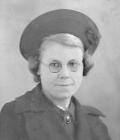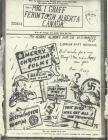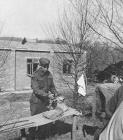14
You could have knocked me over with a feather. I couldn't believe it. Here, I thought we were going west towards Hawaii and Japan. I wasn't too fussy about going to England. Heard what it was like over there. Cold, rainy and muddy. Short of food. Short of everything.I was eight days on a boat that zigzagged all over the North Atlantic. They shoved us into rooms below deck. Thirty men to a room. In the corner, were rolls piled high and on the ceiling were a number of strong hooks. So we started hanging up hammocks. Someone didn't get started on the right hook in the corner and when we got to the other end, one guy wound up having only one hook for his hammock. Then there was a hell of a scream, "I got only one hook! What the hell are you guys doing?" So, we had to take them all off and put them on the proper hooks. Such sailors you never did see.
We landed in Liverpool, jumped a train and wound up in Aldershot. It was a kind of military town, all two-story buildings built of brick with iron steps going up to the pulpit with an iron railing. Our steel shod boots rang on those iron steps. I can still hear it. Clatter, clatter. Crash, crash.
15
The bunks we had were made of iron too. Iron slats about two inches wide and a quarter inch thick. The mattress was in three pieces. They called them 'biscuits.' During the night, while you were asleep, the piece at your feet would fall on the floor. The middle piece would be down by your legs. The other piece would be up at your head. Your back would be on the steel slats every morning when you woke up.17
In June, we got to the regiment and trained all over Southern England…I can't even remember all the places we went to on maneuvers because there were so many. It was in 1942, while on leave in London that I met my future wife, Florence Wilkinson.18
In November, 1943 the Westminster Regiment, 5th Division left England for the battlefield. A ship in a convoy was sunk ahead of us by submarines (there was a bunch of nursing sisters on it), and so our ship was rerouted to North Africa.From Algiers, we traveled by train to an eastern port called Philippeville. Another ship was waiting for us there and we took off next day for Italy. I stepped onto Italian soil at Naples on December 1st, 1943 and never got out of there until March 1945.
Our camp that first night was out in a field and the army had sent an advance party to fix up the place for us. As we walked along in the mud, one of the advance party says, "Just wait and see the place we have for you." They had two Italian ground sheets buttoned together to make a pup tent. We had to lay down under that. The ground was damp and muddy and it started to rain again. Those sheets weren't long enough to have your head and feet under at the same time. One way, your feet were in the rain. The other way, your head was in the rain. About that time, I was ready to go home.
20
We left the town of Materia and moved north towards the front line, the Sangro River on the Adriatic Coast. The First Division got in a hell of a fight around Christmas time at Ortona. Had a number of platoons wiped out. They were way under strength. That is where we did most of our scrapping. The Germans withdrew and the city fell around Christmas, 1943.After Christmas, we went north. Cassino was blocking Highway Six leading to Rome. There were three big battles for it that winter. After Cassino was bombed, you couldn't tell where the town had started or ended. Buildings were just rubble.
Finally towards spring the allies wanted to take Rome. They moved the Canadian core over there. They had been fighting all winter trying to do it.
21
In the campaign to take the Hitler Line, the 5th Division's job was to do a river crossing (Melfa River). It was about thirty yards wide. Wasn't very deep either. About three feet on our side and about a foot deep on the other side. It was the month of May and the spring runoff was pretty well over. But the water was cold and current was so strong it would just about take you off your feet.There was a bank four feet high on our side. Dropped off, straight into the water. So, our old trucks would never negotiate that thing. Nobody seem to know about it till it was too late. When we got there, they were wondering how we were going to get our guns across the river.
The Colonel of the tank regiment says, "We'll pull them across with our Honey tanks. The Honey tanks were just a light American tank; absolutely useless to use as a tank, but they used them for reconnaissance. They could travel to beat the dang. So, they came to pull the guns but they never had any hooks on the back. No trail hook. Straight wall of steel.
23
There were three trucks ahead of us, or three vehicles. The first one was a fifteen hundred weight truck; it got blown up. The next one was a Bren Gun carrier. It blew up. Then a Scout car with seven men in it. It took a shell right in the side of the driver's door. Killed seven men in one shot. One guy got blown off - there was no top on the Scout cars. He got blown off about ten feet I suppose; he wasn't even hurt for some reason or another. These guys were on fire when they were laying; burning away I didn't know men would burn like a torch. Sprayed with gasoline or what? Their skin was burning with a blue flame. One of the MPs came along and poured his water bottles on them. Didn't seem to help much. They were still burning away.Then the Colonel came along - it was our turn to go next after seeing these three vehicles get blown up - it was our turn to go next. The Colonel came along and stopped the foolishness. If he hadn't of stopped us, I probably wouldn't be here.
24
When it started to get dark, we manhandled the guns across the river. Took all night to get three guns across. The German artillery started first, then our artillery. They expected this German attack to come at dawn but they had been pulling out during the night.Some of our tanks came across. There was a crossing further down the river. It had a foot of water and a nice hard gravel bottom. Of course, it would have been a death trap the day before. They struck out in front of us across a field. It wasn't four minutes before three of them starting burning. Next to a barn beside a house was a tank or a self-propelled gun. I fired a shot and that's all that happened. I don't know what the results were but we never got any more fire.
When we got to Highway Six leading to Rome, the Germans had sneaked around the mountain, somewhere up north of us, and opened fire again. They hit an artillery truck, loaded with ammunition that was travelling on the road. We ducked into a sewer ditch when the shelling started.
26
After the fall of Rome in June 1944, the Germans retired to the Gothic Line, and we moved to a place south of Cassino, near the Volturno River. We camped on a hot dry hillside with the lizards and the scorpions. There were no towns within walking distance, however, we did get three days at a beach south of Rome. We got to do a lot of swimming. Waves about four feet high washing up on the sand. It was about one hundred degrees; beautiful, lovely. Then we had to go back to camp and sit in the broiling sun with the lizards and scorpions.I remember when we started into the Gothic Line. We moved into a farmhouse on a hill. I was snooping around the yard to see what I could find. I saw a German helmet laying in the yard and walked over. A nice souvenir, I thought and went to pick it up. I looked at it. It was so darn clean. Just wiped you know, not a speck of dust on it. I got suspicious of the thing; it didn't look quite right. So, I left it alone. That evening I heard that someone had picked up a helmet in the farmyard and got his head blown off. I was glad I didn't touch the damn thing. Used some pretty good tricks for their booby traps.
After we got back to the regiment, it wasn't too long before we were heading north to follow the retreating Germans towards Rimini. The Canadians had taken that city before we got there.
Churchill wanted the American Fifth Army and the British Eighth Army to drive straight north into Austria. We had to go through some low ground at a place called Bagnacavalo. It was all dikes, ditches and canals. The Germans had messed it all up; flooded the fields for miles around. Miles of mud; that was what we had to wade through.
27
We were supposed to stop the German retreat out of the town of Ravenna; go to a highway and block a crossroad. I don't know how far away we were from this crossroad; nobody knew where we were. We stopped at several farmhouses so the officers could look at some maps. There were two big farmhouses together. The officers went into one of them, some place to make a light. All of our guys walked into the barn to have a smoke. They were smoking, smoking, smoking; the inside of the barn was blue with smoke. I wanted a smoke too, but there wasn't even room to sit down. Just standing room only. I could not get in there. So, I was standing outside beside the house with the soldiers on guard.We thought we heard something coming down the road. HOLY SMOKES! It was a column of Germans coming down the road in the dark. A whole bunch of infantry marching alongside the half-tracks and self-propelled guns. They were darn near on top of us before we heard them. They were idling their motors and rolling along quietly. Their half-tracks ran a heck of a lot quieter than the ones we used because you could hear our half-tracks five miles away. When they walked by us they were smoking, talking and laughing. All you could see were the silhouettes of the vehicles and men because of the fog. The whole damn column went past.
There were three Germans coming along behind the column. One was an officer, and two NCO's. Just then our officer poked his nose out of the door to see if they were gone. The German officer saw him looking out the door. He comes running up, kicks in the door and goes charging in like a mad bull. Our Colonel stuck his Tommy gun in the German's belly and pulled the trigger and nothing happened. So he drops the Tommy gun and grabs him and they were dancing around. The German was trying to pull his pistol out but couldn't do it. One guy hit him on the head with a Tommy gun but that didn't seem to fizz on him. Finally, another guy pokes his rifle in between the two of them and pulled the trigger. Shot him through the belly but he still didn't go down. Conked him on the head again with the Tommy gun and finally he collapsed. He never got up again either. He stayed there.
About this time, the Corporal came out and says, "Let's get around to the back of the house." Behind the house was a ten-foot ditch with a little water in the bottom. Meanwhile, this German column that had gone by ran into another of our companies farther up the road so they turned around and started charging down the road towards us, shooting.
Our guys finally got out of the barn by way of the back door. I thought that they were still inside; it was so dark that I couldn't see very much. They were down in the ditch a short distance from me.
Our officer called for the artillery about ten miles behind us. By this time, I was laying on the ditch bank beside a guy with a Bren gun. Pieces of the shells from the artillery fire thumped into the bank between us and we were only two feet apart. We ran down the canal a ways and there we found the whole company. Some guy hollers that there were a whole bunch of Germans in the ditch. We didn't know there were that many; forty of them came out. It was kind of scary because of the fog and you could see the men's dark shadows thirty feet away.



